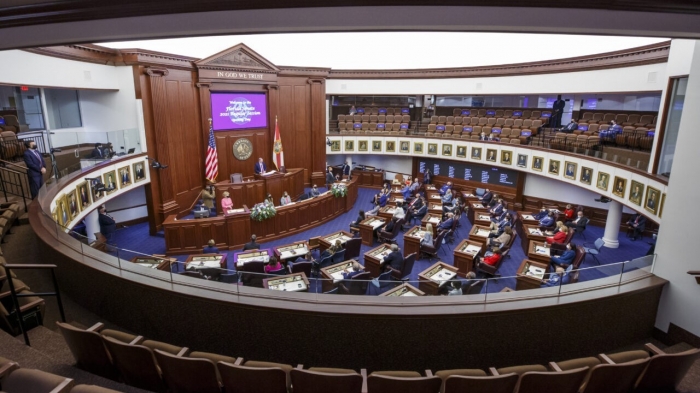Casinos and card rooms would be able to operate without running harness or jai-alai matches
A
Florida Senate committee on Monday advanced bills to create the Florida Gaming Control Commission and to end live racing as a condition of operating slot machines and card rooms.
As the proposal was presented before the Senate Regulated Industries Committee, SPB 7080 ran into the same hurdles that similar attempts have faced year after year. The owners of a race track warned that the change will devastate their business and lead to the loss of jobs, Tampa Bay Times reports.
This year, the opponent was Gulfstream Park Racing and Casino in Hallandale Beach, whose president warned the committee that the bill will lead to more competition for the track’s slots operation, lowering proceeds for thoroughbred horse races and leading to fewer race days in Florida.
“The consequences of creating an uneven playing field amongst slot permit holders would be devastating to the Florida thoroughbred industry, which is one of the largest agricultural sectors in the state of Florida,’’ said Mike Rogers, president of the Stronach Group, which owns Gulfstream Park. “Any reduction in casino purses would significantly impact local jobs and the underlying stability of the horse racing industry.”
The bill allows casinos and card rooms to operate without running harness or quarter-horse races or jai-alai matches, a concept known as decoupling. For decades live racing has declined in popularity as slot machines and card rooms have become more lucrative sectors of the gaming operation. But because thoroughbred tracks would continue to be required to operate live racing, they would have to finance those operations while their competitor casinos would not.
The House has not yet drafted any similar legislation yet. Sen. Travis Hutson, the committee chair, said he expects the House to propose similar legislation sometime this week.
Absent from the Senate proposals is a plan to transfer a gaming permit from Broward County to Miami Beach’s Fontainebleau Hotel and Resort, a top priority of real estate mogul Jeff Soffer. Soffer met with Senate President Wilton Simpson and House Speaker Chris Sprowls in an attempt to get legislators to give renewed attention to a bid for a Miami Beach casino. That talk could be revived if Simpson and Gov. Ron DeSantis negotiate a gaming compact with the Seminole Tribe of Florida. Under most scenarios, that plan would bring in $650 million in additional gaming revenue by allowing the Seminole Tribe to operate craps and roulette at their seven casinos and have the exclusive license to operate online sports betting in exchange for the Tribe’s resuming revenue-sharing payments to the state.
But those talks have struggled to reach a conclusion and Hutson said Monday if they aren’t concluded by the end of this week, it will be too late to accomplish a deal before session ends on April 30. He said negotiators with the Seminole Tribe told him Monday, “they’re closer than ever.”
The only live racing to continue under SPB 7080 would be at thoroughbred race tracks — Gulfstream Park and Tampa Bay Downs. While Gulfstream’s operators spoke in opposition, others in the horse industry supported the bill but asked the committee to reward horse owners for being willing to commit to operating a full racing schedule to keep alive what they said was 23,000 jobs and $2.7 billion in economic activity.
“We are hopeful that additional consideration will be given towards our thoroughbred track partners in terms of rewarding their commitment and significant ongoing investments,’’ said Lonnie Powell, chief executive officer of the Florida Thoroughbred Breeders and Owners Association.
The committee added what Hutson called a “technical strike-all” amendment to SPB 7080 and SPB 7076, which would create a Florida Gaming Control Commission. Both bills were passed by the committee without opposition.
Under SPB 7076, the state would transfer authority over gaming regulation from the Division of Parimutuel Wagering under the Department of Business and Professional Regulation to the new Gaming Control Commission, housed in the Department of Legal Affairs under the attorney general.
The bill grants additional investigatory and prosecutorial authority to the Office of Statewide Prosecution in the Department of Legal Affairs. The commission would be comprised of five members, appointed by the governor, each picked from a different judicial district. The Office of Statewide Prosecution would have additional authority to investigate and prosecute any violation of Florida laws relating to lotteries, amusement facilities and gambling.



